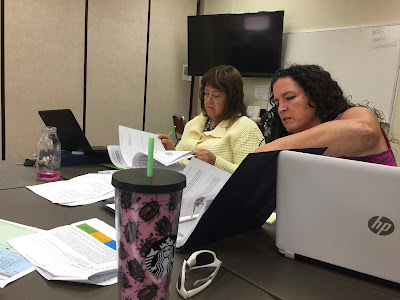 |
| Biology teachers from Channel Islands and Camarillo got together again to reflect back and plan forward for OER this school year. |
As the second semester quickly approaches, the OUHSD OER team in Biology got together once again. The two schools, Channel Islands High School and Camarillo High School, have continued to use the OER textbook for the first semester that they created together over the summer. They have also since received a class set of Chromebook carts to help support their efforts.
The team worked with Corene Duarte, the learning design coach (LDC) for Science in OUHSD. She had them all share three success thus far and three frustrations. What I was hearing from teachers for their successes was very exciting and encouraging. They were pleased with how moving to OER had forced them to focus more on the standards themselves and not just looking at the textbook. They also said that it really made them get familiar with the Next Generation Science Standards (NGSS) which they only had limited experience working with in the past.
Some of what I overheard included:
"It has forced me to focus on teaching the necessary content--not just what's next in the textbook"
This is great to hear. OER has helped teachers focus on the standards and the content and not just following what the textbook says to do next. I would argue that this makes teachers take more ownership of what is being taught.
"(OER) shook things up so you have to do it differently"
I think this is great. Not only on a personal level so that you don't get stuck in a rut of just doing the same thing over and over, but also it is forcing teaching to look at what it is that they want students doing with the material. There is a need to shift from our old standards and way of doing things to a more student-centered way and with higher level thinking and inquiry. The shift to OER opens up a door to start to make that shift.
"Getting them onto computers wasn't as hard as I thought it would be."
"Amazing how much they didn't know"
"Students started to say 'thank you'"
These are all great for me as the Ed Tech Coordinator. Teachers that might have normally been hesitant to use technology with their students found it to be much easier than they first thought. It was especially helpful that they had each other for support. The second quote was referencing how much time students spend on devices, they still need proper instruction on the academic use of technology. The last quote came from a teacher that was sharing that her students wouldn't normally care that much about an assignment but were asking for help on the tech side (like keyboard shortcuts for example) and when given the answer were saying "thank you"... a sign that they were finding the information valuable.
"The best discussion I had with my students was where I messed up"
I love this because it goes with the whole Growth Mindset philosophy of failing forward. We as educators don't have to always have all of the answers or be the expert on everything. One teacher shared that she skipped part of an assignment that she later realized was a critical piece of the activity. The students worked through it and found out that the teacher didn't have the answer key. They didn't know if they had solved the answer correctly or not and this leads to some great conversations.
"Scientists don't have an answer key"
This piggybacks the previous quote. It's very simple but very true. So much of science is doing science. Not just trying to find the "right" answer.
 |
| The Biology OER team works on a unit for semester 2. |













